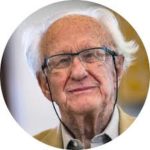Father of Peace Journalism Passes Away, Leaves Powerful Legacy
JOHAN GALTUNG MEMORIAL, 26 Feb 2024
Steven Youngblood | Peace Journalism Insights – TRANSCEND Media Service
Monday, February 19, 2024 – The peace journalism and peace studies fields lost an intellectual and moral giant last weekend [17 Feb] with the passing of Dr. Johan Galtung at 93 years of age.
Dr. Galtung is widely credited with being the father of both academic peace studies, including the concepts of positive and negative peace, and peace journalism, which he and others launched in the 1960’s.
 I was privileged to collaborate with him on several occasions. I interviewed Dr. Galtung for my textbook “Peace Journalism Principles and Practices” in 2015. We spent an afternoon eating pizza, sipping tea, and talking about peace, peace journalism, and the state of media. It’s among the most fascinating three hours I’ve ever spent. Dr. Galtung was polite, gracious, and humble. Even well into his 80’s at the time, Dr. Galtung’s intellectual light burned bright. In fact, there were times during our visit that I noticed Dr. Galtung slowing down to explain things to me, not in a condescending way, but as a colleague and friend. His observations were insightful and profound, and integral to the success of my book.
I was privileged to collaborate with him on several occasions. I interviewed Dr. Galtung for my textbook “Peace Journalism Principles and Practices” in 2015. We spent an afternoon eating pizza, sipping tea, and talking about peace, peace journalism, and the state of media. It’s among the most fascinating three hours I’ve ever spent. Dr. Galtung was polite, gracious, and humble. Even well into his 80’s at the time, Dr. Galtung’s intellectual light burned bright. In fact, there were times during our visit that I noticed Dr. Galtung slowing down to explain things to me, not in a condescending way, but as a colleague and friend. His observations were insightful and profound, and integral to the success of my book.
Subsequently, I corresponded occasionally with Dr. Galtung up until the last few years. I would sometimes send him questions from my students, and he would answer. (Q: “If journalists believe in peace journalism, shouldn’t they advocate more directly for peace?” A: “If they advocate, they cease to become journalists. Journalists who believe in peace can best advocate by giving a voice to peacemakers, and by practicing peace journalism.”) On Twitter, he would re-tweet my posts, and often promote my peace journalism work in the process, urging his legions of followers to read The Peace Journalist magazine, or check out my blog. Of course, I was thrilled by his kind words.
According to my interview with Dr. Galtung for “Peace Journalism Principles and Practices,” he created peace journalism in Oslo “in the early 1960’s.” Dr. Galtung said he coined the term because he believed “journalists have to learn to write about peace and core structural issues, and to focus on common people.” He said he was encouraged to develop the concept, in part, due to a 1960’s study that showed that foreign news was largely negative; often included an actor (bad guy); featured elite people; and centered on elite countries.”
Dr. Galtung’s original concept was further developed in a bucolic setting at the Taplow Court estate in southern England in August, 1997. This estate, home of the UK cultural center of Soka Gakkai International, a Japanese Buddhist organization, hosted a meeting with Dr. Galtung, Jake Lynch, and other journalists. At the meeting, participants discussed developing “a pattern for many an attempt to bring journalism and Peace and Conflict Studies to bear upon one another.” This meeting in turn led to a project by Lynch called “Reporting the World,” which ran from 2001-2005 and launched a discussion among London journalists about conflict reporting and journalists’ role in mitigating, alleviating, and transforming conflicts. Peace journalism was off and running.
Dr. Galtung was nominated for a Nobel Peace Prize in 2017, and made the short list of 32 individuals who were considered for the prize (he didn’t win). His nomination, from Prof. Richard Falk of Princeton University and the Univ. of California-Santa Barbara, stated, “Johan Galtung has been the sort of dedicated warrior for peace that it seems to me the Nobel Prize was created to honor. By so doing, (this will) raise public consciousness of what must happen if we are to overcome the war system and enjoy the material, political, and spiritual benefits of living in a world of peace premised on the nonviolent resolution of disputes among sovereign states and respect for the authority of international law.
“For decades Johan Galtung has been an inspirational presence in the field of peace studies broadly conceived. His exceptional vitality and mobility has brought this message of understanding and insight into peace with justice to the four corners of the planet in a remarkable fashion that is truly unique in its educational and activist impact. It is no exaggeration to write that he invented and established the field of peace studies as a respected subject of study in institutions of higher learning throughout the world. As a consequence of his charismatic speaking ability and seminal writing Johan Galtung has reached the hearts and minds of thousands of people throughout the world, conveying the belief above all that peace is possible through the dedicated efforts of ordinary people.”
Dr. Galtung founded Transcend International, which hosts hundreds of his articles, and pieces from others, on peace journalism and other peace-related topics. A complete biography listing his many accomplishments and awards can be found on the Transcend website as well. Also see an interesting article in The Guardian that includes his thoughts on the negativity of news.
Thanks to Dr. Galtung, we now understand that peace is much more than just the absence of war, and that media have a role to play in mitigating conflict.
Even after his passing, Dr. Galtung’s work will continue to provide a much-need beacon to light our path through these dark, troubled times.
_________________________________________
 Steven Youngblood is the founding director of the Center for Global Peace Journalism at Park University in Parkville, Missouri USA, where he is a communications professor. He has organized and taught peace journalism seminars and workshops in 27 countries/regions. Youngblood is a two-time J. William Fulbright Scholar (Moldova 2001, Azerbaijan 2007). He also was named U.S. State Department Senior Subject Specialist in Ethiopia in 2018. Youngblood is the author of Peace Journalism: Principles and Practices and Professor Komagum (2013). He edits The Peace Journalist magazine, and writes and produces the Peace Journalism Insights blog. He has been recognized for his contributions to world peace by the U.S. State Department, Rotary International, and the UN Association of Kansas City.
Steven Youngblood is the founding director of the Center for Global Peace Journalism at Park University in Parkville, Missouri USA, where he is a communications professor. He has organized and taught peace journalism seminars and workshops in 27 countries/regions. Youngblood is a two-time J. William Fulbright Scholar (Moldova 2001, Azerbaijan 2007). He also was named U.S. State Department Senior Subject Specialist in Ethiopia in 2018. Youngblood is the author of Peace Journalism: Principles and Practices and Professor Komagum (2013). He edits The Peace Journalist magazine, and writes and produces the Peace Journalism Insights blog. He has been recognized for his contributions to world peace by the U.S. State Department, Rotary International, and the UN Association of Kansas City.
Go to Original – stevenyoung.blogspot.com
Tags: Johan Galtung, Obituary, Peace Journalism
DISCLAIMER: The statements, views and opinions expressed in pieces republished here are solely those of the authors and do not necessarily represent those of TMS. In accordance with title 17 U.S.C. section 107, this material is distributed without profit to those who have expressed a prior interest in receiving the included information for research and educational purposes. TMS has no affiliation whatsoever with the originator of this article nor is TMS endorsed or sponsored by the originator. “GO TO ORIGINAL” links are provided as a convenience to our readers and allow for verification of authenticity. However, as originating pages are often updated by their originating host sites, the versions posted may not match the versions our readers view when clicking the “GO TO ORIGINAL” links. This site contains copyrighted material the use of which has not always been specifically authorized by the copyright owner. We are making such material available in our efforts to advance understanding of environmental, political, human rights, economic, democracy, scientific, and social justice issues, etc. We believe this constitutes a ‘fair use’ of any such copyrighted material as provided for in section 107 of the US Copyright Law. In accordance with Title 17 U.S.C. Section 107, the material on this site is distributed without profit to those who have expressed a prior interest in receiving the included information for research and educational purposes. For more information go to: http://www.law.cornell.edu/uscode/17/107.shtml. If you wish to use copyrighted material from this site for purposes of your own that go beyond ‘fair use’, you must obtain permission from the copyright owner.
Read more
Click here to go to the current weekly digest or pick another article:
JOHAN GALTUNG MEMORIAL:
